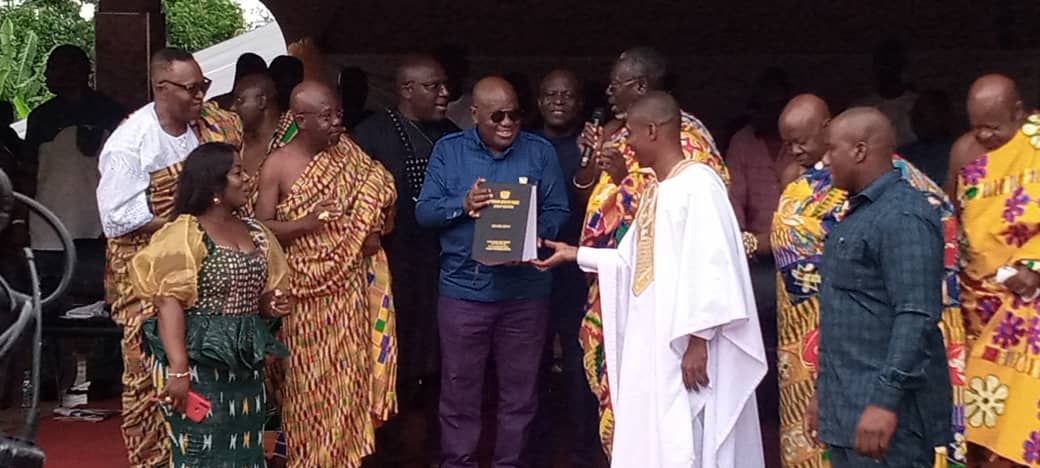
Kwahu State Book documenting chieftaincy lineage launched
A book documenting the divisional stools, the paramountcy of Kwahu and a historical account of lineage in the Kwahu area of the Eastern Region has been launched as part of the 2022 Easter Kwahu festivities.
The rationale behind chronicling the lineage and succession is to help identify the rightful royals to ascend divisional stools and ultimately help do away with chieftaincy disputes in the Kwahu Traditional Area.
President Nana Addo Dankwa Akufo-Addo on Saturday [April 16, 2022] launched the 2000-paged book entitled Kwahu State Book.
The compilation of the book was based on the findings of the Ghana State Book Project which gives vivid account of successions to the various stools in the country of which the National House of Chiefs, Centre for National Culture and the Bureau of Ghana Languages made inputs.
At the durbar to officially launch the the new book at Mpraeso on Saturday, President Akufo-Addo said most of Ghana's security challenges were due to chieftaincy disputes and mentioned some of such challenges as the Dagbon chieftaincy dispute.
According to him, the launch of the voluminous Kwahu State Book would help to avert chieftaincy disputes in the Kwahu Traditional Area.
Chieftaincy disputes costly
The President said since he became the Head of State a lot of money had been spent on the settlement of chieftaincy disputes.
He explained that the book would ensure that only rightful royals would be made chiefs and therefore urged various factions to take note and make good use of the book.
"Let's do away with chieftaincy related disputes and misunderstanding among each other and forge ahead in unity to accelerate the socio-economic development of the Kwahu Traditional Area", the President indicated.
![]()
The Kwahu State Book
The Paramount Chief of Kwahu, Daasebre Akuamoah Agyapong II, said the Kwahu State Book is the first edition of the historical data and cultural practices among others of towns and villages including the migration pattern of constituents from various places to Kwahu.
He stated that the book would be subjected to proper reviews as and when its contents were to be updated.
Daasebre Agyapong indicated that the original records which were collected from all corners of Kwahu were subjected to further investigations and authentication or otherwise by a Review Committee comprising three members from the Kwahu Traditional Council including the Registrar and a member each from the National House of Chiefs, Ghana Tourism Authority, Bureau of Ghana Languages, National Commission on Culture and the Daasebre Development Advisory Board with the Coordinator from the Ghana State Book Project as Chairman.
He noted that the Review Committee which met the rank and file of Kwahus for several months did a good job and had to be commended.
Portuguese era
Giving the historical account of Kwahus, the Paramount Chief stressed that the Kwahu Kingdom was in existence long before the 17th century and that, during the Portuguese era in the 16th and 17th centuries, Kwahu was already in existence.
Daasebre Agyapong intimated that, it was therefore not surprising that the Gold Coast map of 1629 by the Portuguese captured two Kwahu settlements.
Reference material
He emphasized that the book which could pass for a reference material for academics, researchers, lawyers, members of Judicial Committees and the general public was expected to address chieftaincy related conflict and others which unnecessarily cost litigation factions, time, huge sums of money and property that could otherwise go into supporting development.
Lineage succession
The President of the National House of Chiefs, Ogyeahohuo Yaw Gyebi II, praised the Kwahus for documenting their traditional and culture especially lineage succession that would help avoid chieftaincy crisis.
Next generation
The President of the Eastern Regional House of Chiefs, Nene Sakite II indicated that the book would make it possible for Kwahus in the next generation to know what the Kwahus truly stand for.
He urged all traditional councils to emulate the Kwahu example.
Earlier, the Coordinator of the Ghana State Book Project, Isaac Bright Botwe said similar books detailing lineage succession had already been launched in Awutu in 2012, Techiman, 2014, Offinso, 2016, Ahafo Hwiediem, 2017 while that of Tepa would soon follow.
According to him, each of the state books had been divided into 14 sections, each dealing with peculiar issues relating to chieftaincy disputes.
Present at the event included traditional authorities and other dignitaries such as the Omanhene of Asante Akyem Domeabra, Baffour Owusu Bediako who represented the Asantehene Otumfuo Osei Tutu II, Seth Kwame Acheampong, Eastern Regional Minister, Julius Debrah, Former Chief of Staff and representative of former President, John Dramani Mahama, members of the Council of State, Ministers of State, Members of Parliament, Members of the Diplomatic Corps, Municipal and District Chief Executives and Kwahu indigenes both in Ghana and the diaspora.
